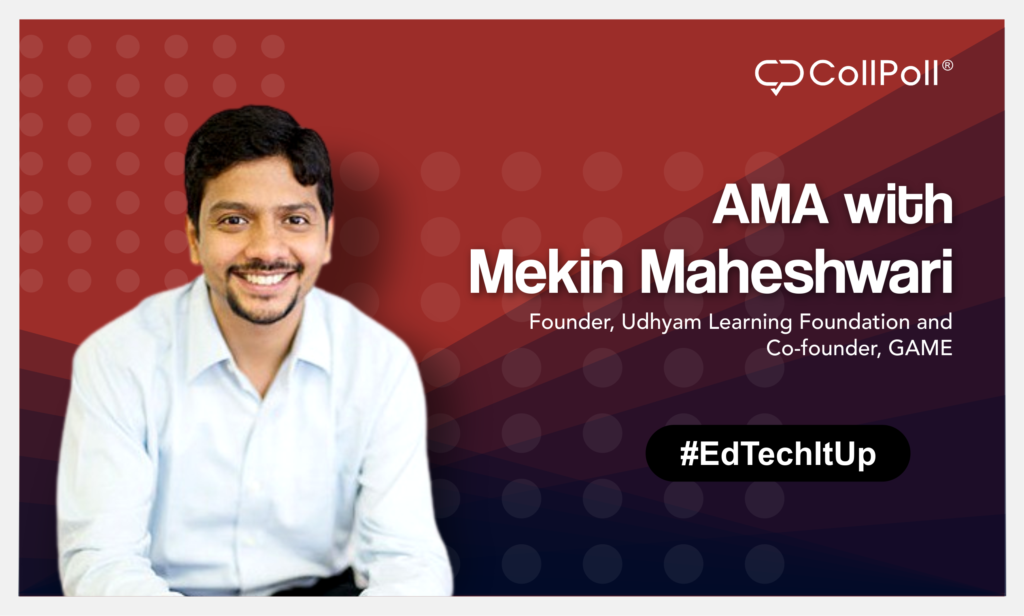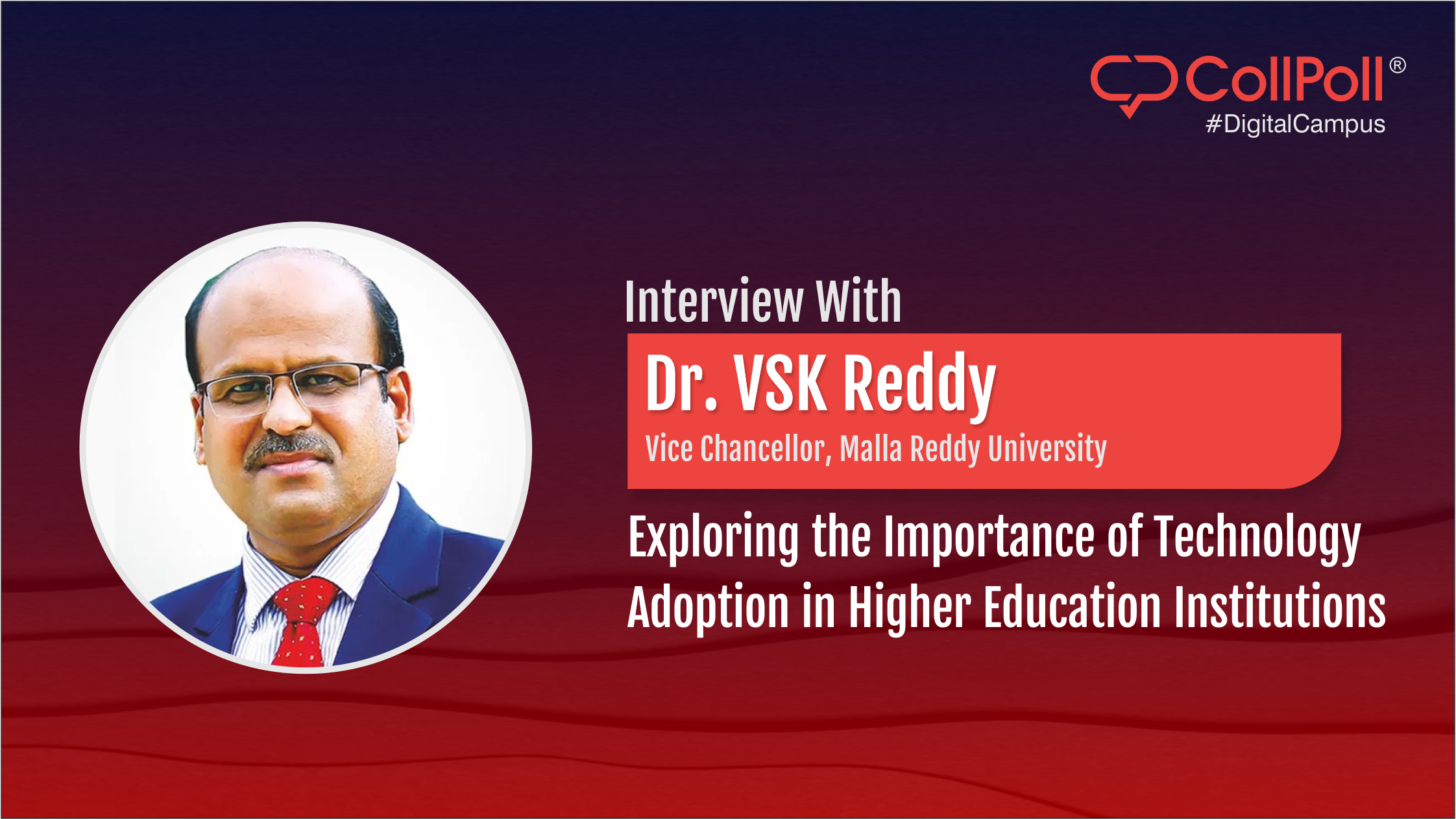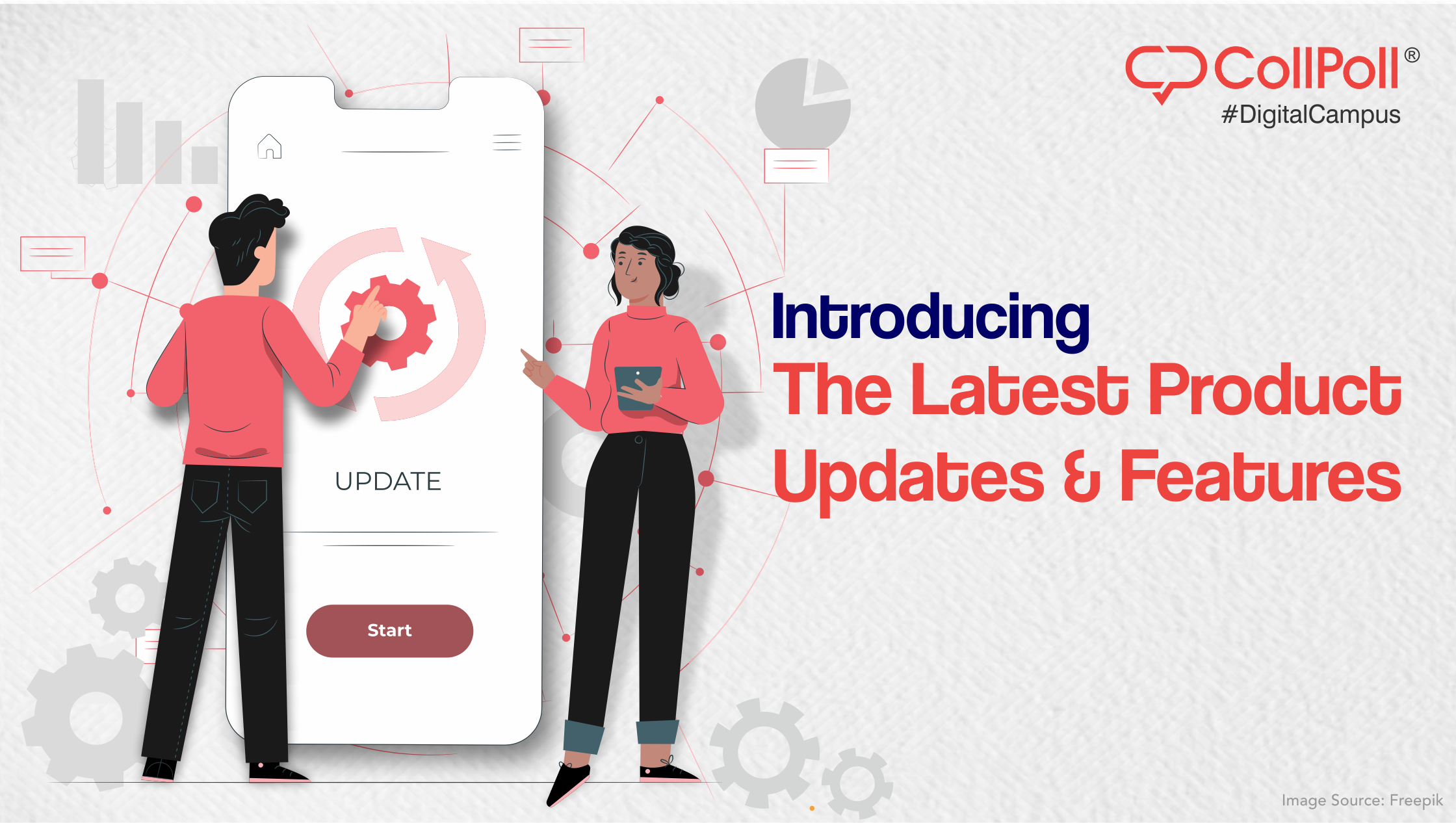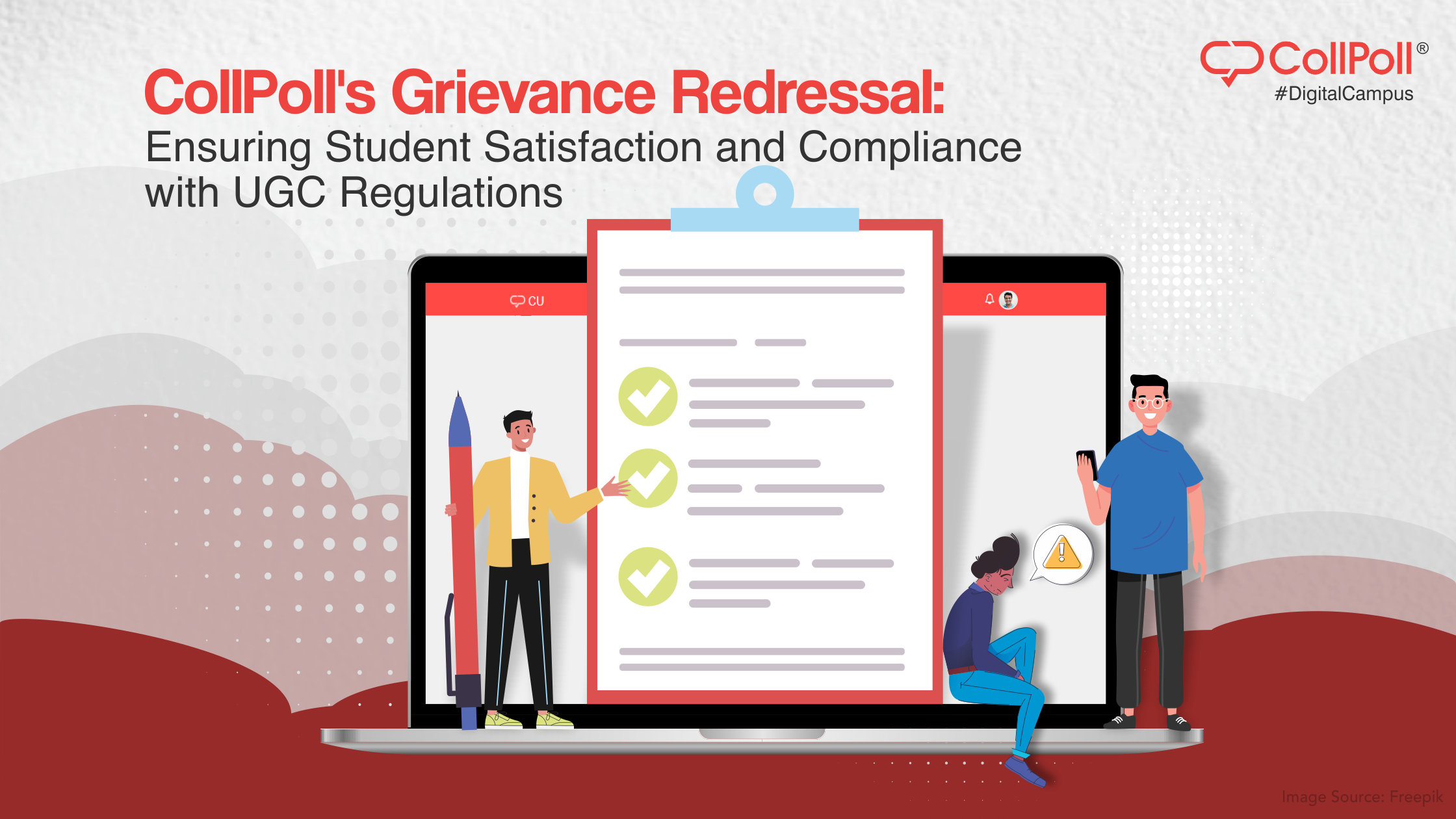Learning is an essential part of CollPoll’s culture. From developing morale and motivation in team members to enabling a platform for them to share their opinions and ask questions that help them in their roles; learning opportunities boosts the performance of team members as well as our organisation. So, to cover all the perspectives of learning and have a chit-chat around various topics and emerging areas of technology and culture we have been running our AMA Series.
Bringing in our next guest – Mekin Maheshwari who talks about his journey, learnings from the past, and the overall road to success. Let’s dig in to learn more about him!
About Mekin Maheshwari!
Mekin is the Founder and CEO of Udhyam Learning Foundation and co-founder of GAME (Global Alliance for Mass Entrepreneurship). He is extremely passionate about discovering & unleashing human potential and entrepreneurship. He started Udhyam Learning Foundation which works on developing entrepreneurial mindsets amongst youth from various backgrounds.
He joined Flipkart in 2009 and was one of the early employees. He played various roles – the Head of Engineering, built out a great tech team, and went on to become the Chief People Officer. He left Flipkart in March 2016 and started his career with Yahoo! Later, he joined Ugenie where he created weRead, a successful social network around books.
Mekin is equally passionate about learning, human potential and technology. He loves sports and has recently developed a taste for yoga and meditation as well as experimenting with his diet.
1. Tell us about your Flipkart journey
Before joining Flipkart, one of the most amazing things I was impressed by was the ‘customer-centricity’. In the rented house, where we used to stay, I witnessed every day how our team members used to sort books out on the ground floor so that they could reach the customers on time without delaying it through a standard, lengthy process. The first thing I did was to set up a slave to handle the dumping so that the replication breaks for two hours but not the website and make it a shop that never shuts down.
One of the more vivid things that helped me and others a lot in the company was the 10 minutes induction conducted by one of our fellow mates. We sat in the conference room where he wrote three words on the whiteboard – service, selection, price. The most important thing is Service, meaning speed, doing the right things for customers and serving them the best possible way; selection is the number of books that we sell; and the price at which you sell it (like reducing courier price will also reduce the overall cost). However, you should always focus on shipping the product faster.
2. What made you join Flipkart and stick around for so long even during the tough times?
While my mentors told me that eCommerce won’t be successful in India, Flipkart proved it to be entirely different. I always believed in – “Building the company out of love can bring success to the table without any doubts!” And Flipkart validated it to be actually right. The following 3 reasons motivated me to be a part of the company:
- Customer Delight:
Customer experience was the primary goal of Flipkart. The company used to deliver products before the given arrival time. Thus, attaining customer satisfaction and retention at a larger scale.
- Customer Focus:
In the times when customers were at the mercy of the business, seeing Flipkart so focused on its customers was compelling in itself. The brand used to focus on delivering the best rather than delivering more!
- Deeper Solutions to Problems:
When all eCommerce platforms were focusing on selling as many products as possible, Flipkart was selling only books. Their focus was on solving the problem deeply and meaningfully. While on mouthshut, every other company held the rating of 10-12%, Flipkart gained 75% of positive reviews.
These points were enough to prove my belief right and drove me to join Flipkart!
3. You had an interesting journey from head of engineering to Chief People Officer of Flipkart. Being an essential asset to the company, what lessons would you like to share with us?
The first thing we did at Flipkart was to put in a structured process to have clarity of what capabilities and responsibilities we expect from employees. With early leaders joining the company we framed a ‘Competency Framework’ to jot down our expectations from engineers at every level.
Although I was related to technology, I spent a lot of time building a good team. This experience taught me that I was great at onboarding the right talent at Flipkart. I believe that it is every leader’s responsibility to look out for the right talent themselves to get more conversion and not outsource hiring to recruiters.
Honestly, the Head of Engineering gave me access to more levers compared to the Head of HR. All these challenges taught me the decisions made by HR are irreversible and you need to be more thoughtful about every step you take. However, it’s great to know that many structures I created including the ‘Competency Framework’ are still being used at the company.
4. From learning at Flipkart as an early joiner to running your own company, what are the changes you see? And how are you using those in your current role?
The first thing I learned from Flipkart is ‘Audacity’ to think bigger. The goals we had in 2009 were not right because Flipkart achieved a lot more in the present than we would have ever imagined. We never envisioned it as a billion-dollar company. I’ve learnt that it’s a person’s vision to figure out how to achieve more. And we have been able to apply that at Udhyam
Both Udhyam and GAME are non-profit organizations that work to enable young people to be entrepreneurs by building and integrating curriculum and project experiences. We’ve been able to reach more students by partnering with the government of about 9 states. The belief and confidence in scaling to greater heights, serving customers better, and creating frameworks for everyone within the company came from my experience at Flipkart.
5. It is a bit difficult to keep the customers in tune with the new philosophies that we adapt yet engage them to a level of customer-centricity. How did this transition happen for you at Flipkart and the current two organizations?
I’ve never worked at a B2B company in particular. At Flipkart, our tech team used to interact directly with the customers. This helped us build an understanding of our customers and know their pain points. Similarly, with the supply chain technology team running the demo, the operational team decides what is efficient and has to be operated for the customers. Hence, making the technology and people more customer & business-centric are beneficial for every industry.
Additionally, there should be more focus on customer communication, running production servers in different environments, and releasing products in a sequential manner.
6. While hiring, the person should be a greater priority than their skill initially. Nowadays, companies focus more on putting out standard questions than being a bit personal. So, how do you think hiring should be?
I believe that assessing people on business scenario planning is quite useful for every company. It should be clear to the people what you require from them and evaluation should be based on the work. Besides this, building a common language inside the company is necessary; the hiring team should have a proper structure considering the requirements.
7. Onboarding earlier while having a small team was simpler than now when the company has grown. How did you overcome challenges that came with onboarding at scale during your time at Flipkart?
I learnt a lot about onboarding from Facebook. In 2010, I reached out to a few people in Silicon Valley who walked me through the team, culture, and processes. Earlier at Facebook, every new hire had to move to different teams for six weeks with the goal of pushing the production before the end of the week. This created a culture at Facebook by making the processes part of their systems.
“If there is a doubt in hiring, there is no doubt in hire.”
We incorporated this at Flipkart and also added the option for freshers to choose which team they want to be in. The company managed data at 3 levels – which teams needed people, teams that interns would look forward to joining, and the ratings given by mentors to the freshers. This gave freshers the privilege to know more people, unblock barriers, and grow at a greater pace.
8. Was it always a plan to scale up at Flipkart by offering more products in the future? Was there any plan of action when the company started scaling up and how did you maintain the quality?
It was always in the plan to offer more products over time as the company scales up. In a B2C startup, it is in the hands of customers for when the scaling will happen. The idea of selling books for the first four years, helped Flipkart analyze the core eCommerce problems and solve them fairly. This also taught us how to succeed and capture the market.
We diversified in the field and started selling mobile phones. While our books were selling rapidly, the growth rate for mobile phones was very slow. We realized that the audience for both was different and our company required more trust. So, the plan of action was to put a 30-days replacement policy, conduct advertisements, and provide cash on delivery facilities to build customer trust.
Through continuous platformization and code review processes we developed a lot as a team. It was the team members who helped us maintain the quality of the product even while scaling!
9. While you could have easily gone for a profit venture, why did you choose to run two non-profit organizations?
Financial freedom definitely played a huge role in having two non-profit startups and provided me with a much broader canvas. Secondly, I thought if not me then who? Not enough people get the opportunity to do this, so why not utilize it.
These organizations are a way of solving problems. 55% of students study at government schools and these institutions don’t work for profits. This motivated me to start non-profit ventures as it was important to know – how to address education for people at scale.
10. Companies need various validations while scaling up. Did something stand out during your journey at Flipkart?
At Flipkart, the mantra always was – customers first!
If the customers consider that a company is doing a good job then definitely we are on the right track and should keep going. Besides this, you should also look at your core business metrics to keep an eye on whether or not it is creating an impact and work accordingly. You can easily know from the number of orders that what customers say and what they actually do are two different things.
11. You mentioned earlier that engineers should interact with customers. How frequently should they do it?
At Flipkart, we used to interact with customers during the first week of joining as a part of customer support. The interaction of ensuring customers that they have a say in whatever you do and making changes accordingly is necessary. At least once a week, the engineering team must hear from the customers.
12. What do you think are the Constant and Variable factors we should consider when building a culture?
The things that should be constant while a company’s culture is evolving should be decided by the company themselves. To make things constant, you should make it a part of the living process. For Flipkart, both customer-centricity and ownership were a key part of the culture. We conducted interviews to assess this to know of people who were actually interested in customers and not only technology.
Culture builds by practices and role modelling. Organizations should include values in the hiring process – assess people based on constant values and thus, create a culture.
13. At what point do you think that you should stop resolving bugs and focus on enhancements and vice versa?
If doing something simple takes a lot of time, then you need to fix a few things. However, if you are able to move things fast enough that means you are in a healthy state in the system and you should be aiming higher, trying to do more things.
This boils down to how well are you able to design the system – a good system doesn’t ask for a lot of effort. But if it does, then you should work towards the betterment of the system rather than doing more work.
This AMA episode with Mekin was definitely interesting as well as insightful. Not only did we talk about building and scaling a startup from a technology viewpoint but also how the culture should evolve and how the team should expand. Thank You Mekin for such a wonderful conversation, we look forward to having you again!
Keep watching this space for more AMAs episodes of CollPoll!





